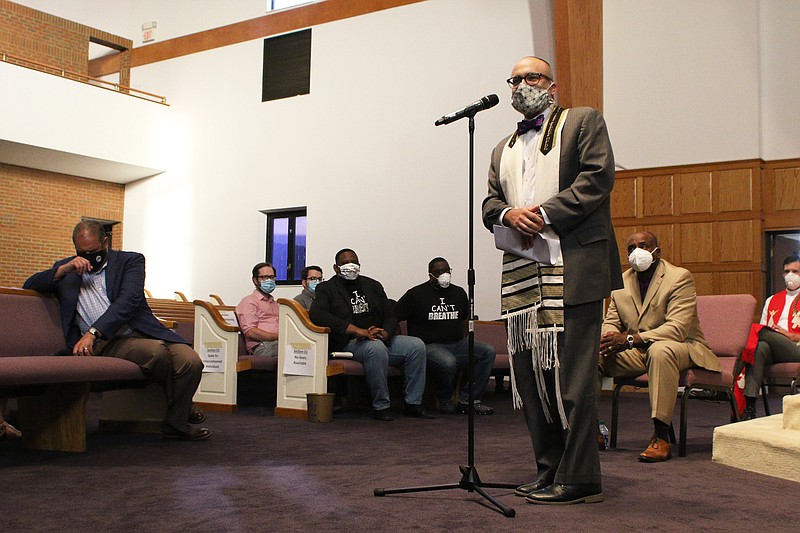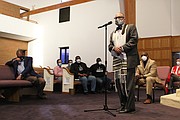More than 20 local faith leaders gathered in the otherwise empty pews of Olivet Baptist Church Monday evening to livestream an interfaith prayer service in response to the death of George Floyd in Minneapolis and the days of unrest that followed nationwide.
Wearing masks and sitting apart on stage and in the surrounding pews, several spoke about the anger of seeing another black person killed by police and the need for unity in creating change.
People must stay focused on the cause of justice for all, not just for some, said Bishop Kevin Adams, senior pastor at Olivet, who helped organize the gathering. The video of a white police officer kneeling on Floyd's neck for nearly nine minutes shocked a lot of people to act, he said.
"Seeing that connected to so many injustices we have witnessed over the years," Adams said. "We have come to a defining moment in history, whereas something has to change. Some things have to stop. And some things need to be done new, and totally different."
Adams worked with Michael Dzik, executive director of the Jewish Federation of Greater Chattanooga Chattanooga, to create the interfaith service, an idea Dzik had on Saturday as protests in Chattanooga and across the country started to grow. Largely peaceful demonstrations happened in the city throughout the weekend and into Monday night, with hundreds of people marching over the Walnut Street Bridge and gathering near the Hamilton County Courthouse to protest police brutality.
Hopefully, the Monday night gathering is the start of a push among faith leaders to address injustice, Dzik said.
Chattanooga Police Chief David Roddy attended the service and spoke briefly. He was thanked by most in attendance for speaking out against the killing of Floyd.
Roddy said when he heard from protesters who wanted to know what changes were going to be made, he encouraged them to weigh in on how to improve law enforcement. He hopes people will come to the table to build a better system, he said.
"You don't want me to build that by myself," Roddy said. "Whatever it is that you picture, whatever expectations you have, whatever problems you know and feel in your heart that we need to address as a nation, as an industry, you have to be part of that conversation."
Rabbi Craig Lewis of Mizpah Congregation said there needs to be more accountability in police departments across the country so the situation that killed Floyd, and dozens of black Americans in recent years, does not continue.
"We know that the wheels of justice for George Floyd turned far too slowly," Lewis said. "We also know that those are the same wheels of justice that have failed for a long, long time. If at any point with Eric Garner, Philando Castile, Oscar Grant, Stephon Clark, Breonna Taylor - and the list goes on - if at any point the justice had been swift, if the officers had been held accountable, then policies would have changed along with the attitudes."
Floyd was killed a week ago, on May 25, in Minneapolis. The officer, Derek Chauvin, seen kneeling on Floyd's neck was arrested four days later on May 29 and charged with third-degree murder and second-degree manslaughter.
Clay Thomas, senior pastor at Rivermont Presbyterian Church, used his time at the microphone to emphasize the troubled history of race in the United States. For 400 years, the country has said black lives do not matter. There needs to be repentance, Thomas said.
Religious leaders must address the local, lived experiences of injustice in the city, he said.
"We have a fantastic police chief, which means we are poised to have an even better police department," Thomas said. "But people are still being harassed in Chattanooga and if we gloss over that here and think we're going to go connect with people in the streets, forget about it."
Many who spoke at the interfaith service called for a strong moral voice from the religious community. The Rev. Dr. Jeffery Wilson, pastor at New United Missionary Baptist Church, said he feels the current moment reflects a quote from the Rev. Dr. William Augustus Jones, who said people should not bring a flute when a trumpet is needed.
"What we have today - from my perspective, friends - is the need for a voice," Wilson said. "A voice that extends beyond political lines, extends beyond racial lines. A voice that is even bold enough to transcend religious differences. Don't bring a flute. We've already brought the flute. What's needed out there is a trumpet."
After the service, some of the faith leaders in attendance walked from Olivet to where the demonstrations were happening downtown. However, some protesters were unhappy with how some clergy engaged police before getting up to speak to the crowd . On Tuesday morning, Marie Mott, who organized multiple protests this weekend, posted to Facebook that the clergy were asked to provide silent support and said Adams owes organizers an apology.
Adams did not respond to a request for comment on Tuesday.
Contact Wyatt Massey at wmassey@timesfree press.com or 423-757-6249. Follow him on Twitter @news4mass.

